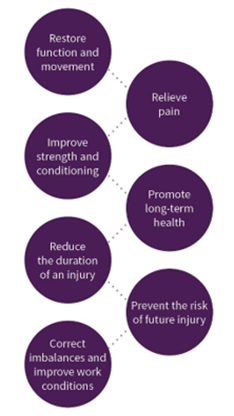Physiotherapists play a key role in recovery and return to work for their patients. They are part of the team of health professionals who help someone to remain in or return to work.
Work gives us a sense of purpose and self-worth, which is incredibly important for our physical and mental health.
There is more to recovery than receiving treatment. The sudden onset of an injury, illness or disability affects the patient and live of their loved ones.
Making returning to work one of your goals
Individuals are more likely to return to their hobbies and sports when they return to work, this increases their satisfaction, build confidence, and improve their overall wellbeing.
Return to work (RTW) programs help ease employees back into work and adjust to their new needs.
Studies have found the likelihood of an employee returning to work decreases, the longer they are away from work.
Returning to work should be a key focus during recovery. Remaining active, including while at work, is an important part of recovery.
Role of physiotherapy
Physiotherapists who specialise in occupational health can provide guidance to people who are ready to return to work after an injury or absence.
They can support a person with functional strengthening programmes, graduated return to work plans and workplace assessments.
When returning to work it is important that the worker’s ability matches the demands of the job, otherwise the return to work will be unsuccessful.
In a return-to-work program, a physiotherapist can support the employee and employer.
They complete workplace assessments, along with advising and implementing any required interventions which can assist with a return to work.
Understanding interventions
In situations where the employee needs additional support to complete the core tasks of their job, interventions will be necessary.
The employee’s ability is the benchmark for returning to work. Each person responds differently to pain and that will influence their recovery.
Interventions also accommodate the employees pain levels, helping them manage their activities and movement. Examples of these include altering certain work tasks or reviewing ergonomic technology for example.
When assessing someone’s fitness to return to work, personal and work-related factors have an impact. These include:
- Depression, anxiety, and psychosocial factors
- Pain management and tolerance
- Fear of movement
- Pain catastrophising
- Low self-efficacy
- Pain coping mechanisms
Physiotherapists consider how a wide range of factors, not just pain, affect work capacity and performance.
If an individual fears that work will worsen the condition, it may have an impact on their ability to return to work.



